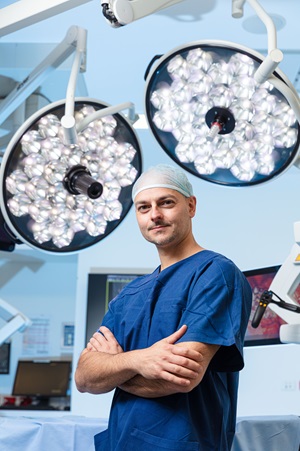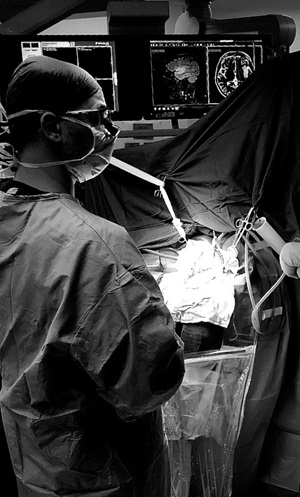2025 | Volume 26 | Issue 1

Professor Di Ieva
Sydney neurosurgeon and academic Professor Antonio Di Ieva is leading the international growth of computational Neurosurgery and artificial intelligence (AI) research.
Professor Di Ieva established the world’s first computational Neurosurgery laboratory at Macquarie University in Sydney and is building an international network of similar laboratories.
These laboratories are using technology to improve diagnosis and decision-making in brain tumour treatment and other neurosurgical diseases.
Professor Di Ieva, an Italian neurosurgeon, honed his expertise across Europe and in Canada before joining Macquarie University. It took two years, but he eventually gained RACS Fellowship in 2017 enabling him to apply for research grants.
In 2019, the prestigious RACS John Mitchell Crouch Fellowship led him to establish the Computational NeuroSurgery (CNS) Lab at Macquarie University. In the lab, Professor Di Ieva is now joined by 20 scholars, supported by the National Health and Medical Research Council and Australian Research Council. Together they work across a variety of projects largely focused on brain tumours, while also performing translational research in areas like computer vision and cognitive neuroscience.
The field of AI is not new but advances in technology and Professor Di Ieva’s pioneering work in the novel area of computational Neurosurgery have increased its potential in diagnostics and decision-making.
Ultimately, his research aims to assist neurosurgeons to make accurate diagnoses—a process that Professor Di Ieva considers should be referred to as ‘augmented’, rather than ‘artificial’ Intelligence.
“We bring various applications to improve the differential diagnosis of tumours and to enhance the physician’s decision-making. All this, of course, is aimed at improving patients’ prognosis.”
In 2022, Professor Di Ieva was involved in another world-first when he founded a computational Neurosurgery Fellowship where an international neurosurgeon spends a year with him and his team at his Sydney lab.
A neurosurgeon from Germany undertook the first Fellowship, and together with Professor Di Ieva published the first computational Neurosurgery textbook. The current Fellow is from Pakistan. Both Fellows are establishing similar laboratories in their home countries, expanding the international network in computational Neurosurgery.
This work is putting Australia on the map as a leader in computational Neurosurgery. It also provided Professor Di Ieva with professional opportunities including regular requests to present and direct sessions at international conferences.
Professor Di Ieva is optimistic about the use of AI in neurosurgery but is well-aware of the cycle that this type of technology tends to follow.
He describes a series of ‘springs’ and ‘winters’, when there are great hopes surrounding the potential of AI, followed by times of disappointment or fear of its possible implications.
“In 2024, there were four Nobel Prizes associated with AI, so we are in an extremely flourishing spring.”
Beyond his professional roles as Professor of Neurosurgery at Macquarie University, Sydney, he is also the Associate Professor of Neuroanatomy at Medical University of Vienna, Austria, and computational neuroscientist. Professor Di Ieva is also bringing his expertise and innovation to the Solomon Islands.
As a volunteer, he treats Solomon Islanders suffering from brain tumours who would otherwise be unable to access Neurosurgery. He is also educating local practitioners on the treatment of neurological problems.

He hopes that in the future, his work in computational Neurosurgery and AI will help local radiologists interpret scans that will assist in the diagnosis of brain tumours.
Despite the very practical applications of his research, it was the “sublime” in Neurosurgery that attracted Professor Di Ieva to the specialty.
“I was really intrigued by the philosophical aspect of the brain, being able to study brains, as well as the anatomical, physiological point of view,” he says.
“It is really intriguing to try to understand one of the most mysterious and sublime—in the romanticism meaning of the word—organs. There are only two big things that are so unknown—the universe itself, and the brain.
“The universe’s dark matter as well as the brain’s grey and white matter share the same fascination.”
Professor Di Ieva believes research plays a vital role in improving the clinical and surgical work of neurosurgeons and encourages others to become involved.
He says that research and clinical work can complement each other, with research providing an understanding of treatments and an ability to question existing methods, and the clinical work providing real-world data for research.
“You can be an academic surgeon without having to cut other things out of your career or your life—it’s just about time management and understanding the benefits that research has. I have been at the peak of my productivity as a surgeon, in the public as well as private sectors, when I was also doing research.”